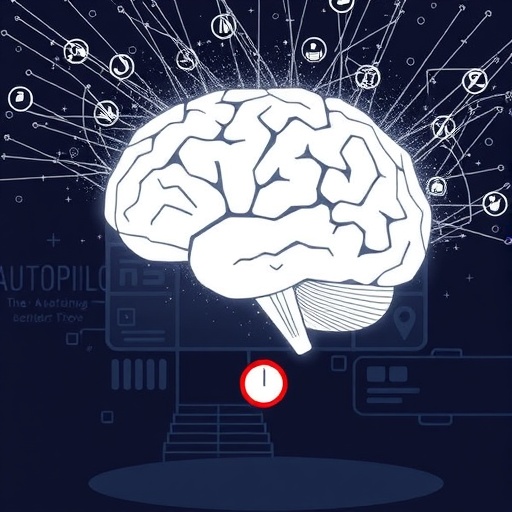New research from a collaborative team at the University of Surrey, University of South Carolina, and Central Queensland University sheds new light on the mechanisms that govern human behavior, revealing that much of what we do each day is driven by habit rather than conscious decision-making. Published in the esteemed journal Psychology & Health, this study rigorously quantifies the extent to which daily actions operate on “autopilot,” challenging long-held beliefs about human rationality and volition.
The investigation employed an innovative ecological momentary assessment method, an approach that captures real-time data directly from participants throughout their everyday lives. Over the course of a week, 105 participants from the UK and Australia received six randomized prompts daily via their smartphones, asking them to report their current activity and whether that action was initiated automatically out of habit or through deliberate intention. This dynamic, in situ data collection method circumvented limitations of retrospective self-reporting, enhancing the validity of the insights into habitual behavior.
Findings were striking: approximately 65% of everyday behaviors were enacted habitually. This indicates that the majority of our day-to-day actions occur without conscious deliberation, triggered implicitly by environmental cues or routine contexts that our brains have learned to associate with particular responses. Habits thus function as a deeply embedded set of automatic reactions, economizing cognitive resources by reducing the need for constant decision-making.
One of the most compelling aspects of the study is its nuanced understanding of how habits interact with conscious intentions. Nearly half (46%) of the behaviors recorded were both habitually initiated and aligned with the individuals’ conscious goals. This duality implies that human behavior is not simply enslaved to automatic impulses; instead, people often cultivate habits that support their objectives and, conversely, strive to disrupt those that oppose them. This interplay between intention and habit formation points towards a sophisticated neurocognitive mechanism facilitating goal-directed behavior through automaticity.
Leading this interdisciplinary inquiry, Professor Benjamin Gardner from the University of Surrey emphasized that the traditional model of behavior change — reliant solely on conscious effort and willpower — overlooks the power of non-conscious habit systems. He explains that “good” habits, once established, can act as potent forces in achieving personal goals by reducing the need for continuous motivational input. Conversely, efforts to abolish harmful habits require more than exhortations to try harder; they necessitate strategic interventions that both identify and disrupt ingrained triggers while replacing them with healthier ritualized behaviors.
The implications of these findings ripple profoundly across fields such as public health, psychology, and behavioral medicine. For example, health promotion campaigns designed to increase physical activity or improve diet must focus on embedding these changes within stable environmental contexts to foster consistent cues and routines. The study advocates identifying everyday occasions—like the time immediately after returning from work or brushing one’s teeth—as anchors upon which positive habits can be reliably practiced and reinforced.
When it comes to breaking entrenched habits like smoking, the research underscores that mere intention is insufficient. Practical strategies might include environmental restructuring to avoid habitual triggers—such as steering clear of locations associated with smoking—and substituting the undesirable behavior with alternative actions, for instance chewing gum after a meal. This kind of habit replacement leverages the brain’s inherent propensity for stimulus-response patterns, rerouting automatic impulses toward beneficial behaviors.
Dr. Amanda Rebar, who spearheaded the study at the University of South Carolina, highlighted the overarching psychological theme that humans often overestimate the deliberateness of their daily actions. Much of what appears as conscious choice is in fact the output of repeated learned associations, underscoring a powerful but often invisible driver of behavior shaping our routines and lifestyles. This finding challenges the classic notion of humans as purely rational agents constantly plotting their next move.
Additionally, Sleep Scientist Dr. Grace Vincent from Central Queensland University illuminated the hopeful message inherent in the research: because many positive habits align with our intentions, there exists the potential for internal “autopilot” mechanisms to take charge and maintain healthy patterns. She mentioned that while most habits readily fall into this category, exceptions such as exercise tend to require more conscious initiation, explaining why maintaining consistent physical activity remains a challenging goal for many.
The technical sophistication of this study lies in its ecological momentary assessment design, which permits temporal and contextual granularity by capturing behavior as it occurs naturally, rather than relying on memory or broad generalizations. This methodology exposes the subtle but pervasive influence of habitual control over behavior throughout the day, bridging a critical gap in both theoretical understanding and practical application.
By quantifying the habitual nature of behavior with such precision and ecological validity, this research offers an empirically robust foundation for designing intervention programs that better harness automaticity. It also encourages policymakers and health professionals to reevaluate approaches that prioritize conscious decision-making alone, advocating instead for habit-centric frameworks that embed behavior change into the fabric of daily life.
In conclusion, this landmark study expands the frontier of behavioral science by demonstrating that the vast majority of our daily actions are not the product of moment-to-moment deliberation but rather the output of deep-seated, learned habits. As such, fostering desirable habits while disrupting detrimental ones may represent the most effective route to sustainable behavior change. Harnessing this knowledge could revolutionize not only individual self-improvement strategies but also public health initiatives aimed at combating lifestyle-related diseases.
Subject of Research: The prevalence and influence of habitual versus intentional behavior in everyday life.
Article Title: How Habitual is Everyday Life? An Ecological Momentary Assessment Study
News Publication Date: 22-Sep-2025
Web References: https://doi.org/10.1080/08870446.2025.2561149
Keywords: Behavioral psychology, Psychological science, Social psychology, Psychological theory




